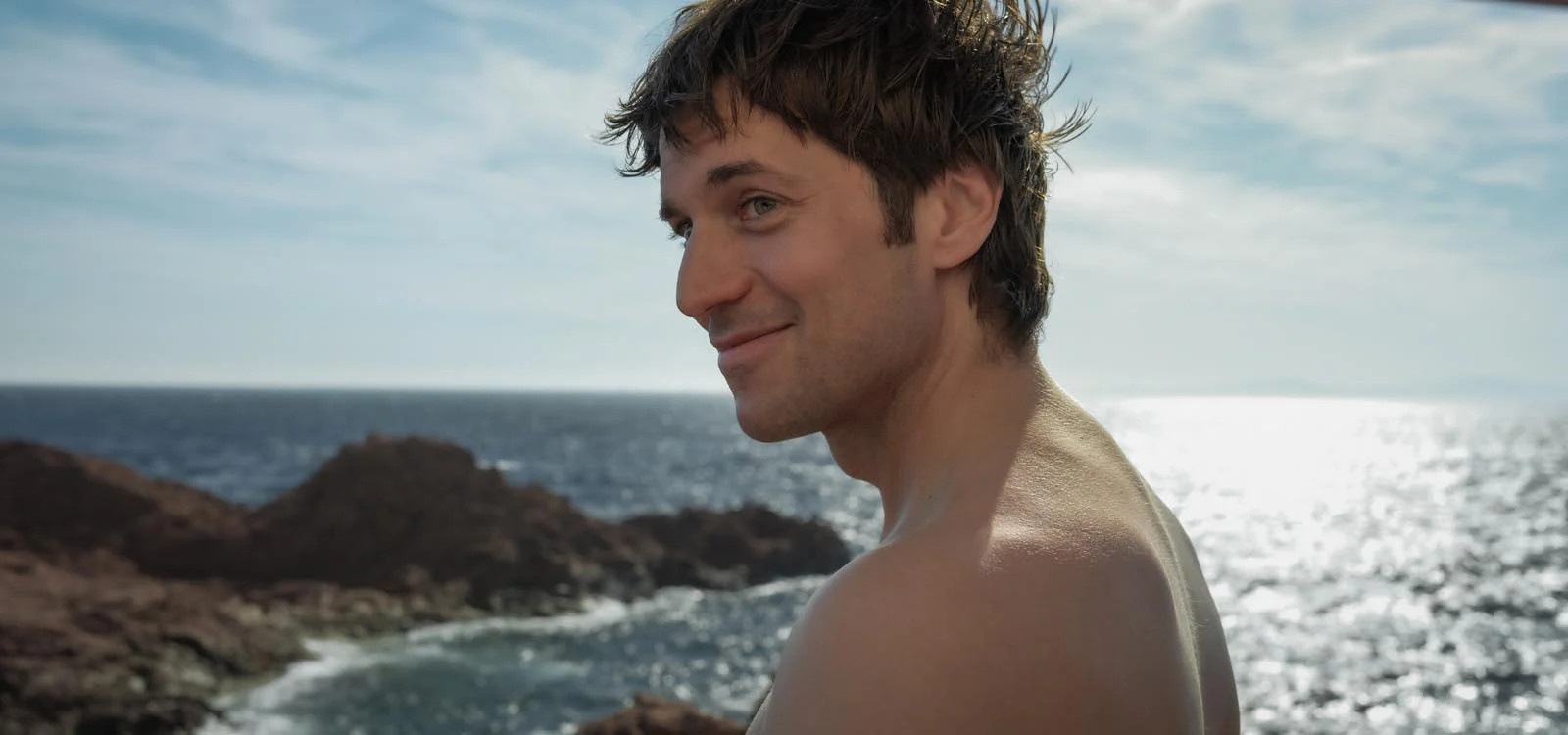Director: Mélanie Laurent
Writers: Mélanie Laurent, Christophe Desplandes
Stars: Lucas Bravo, Léa Luce Busato, Yvan Attal
Synopsis: Inspired by real events, the story of Bruno Sulak, a true Arsène Lupin of the 20th century.
In a movie about a Bonnie and Clyde-esque couple, director, Mélanie Laurent, chooses a breathtaking, opening shot. In an extreme closeup of Léa Luce Busato’s face, her lips are lustrous, her freckles prominent, and the smoke from her mouth forms faint clouds of hazy dreams. Then a reverse dolly camera movement reveals that it’s not a girl lying lazily on a beach, but waiting in her care for her lover to finish a heist. As we realize we’ve been played carefully by the tactful Laurent, we also surrender that the female gaze can make a whole difference in a particular genre like biographical crime dramas.

Freedom stars the enigmatic Lucas Bravo fresh off his Emily in Paris fame, alongside Busato -her first time in front of a film camera- and Yvan Attal. It’s a fictionalized biopic of Bruno Sulak’s life; the modern Arsène Lupin, the handsome gentleman thief with ideals and principles. Instead of focusing on the robberies and the crime element of the film, Lauernt takes a different approach to telling the story.
The film benefits from Laurent behind the screen, a sensitive, passionate woman who knows her directorial tools. Her montages of footage between Bruno and his lover Annie take center stage, even amidst all the intense heists. Laurent benefits immensely from the chemistry between Bravo and Busato, but her keen direction and nurturing of their talents allow her to explore the characters more deeply. In comparison, Sulak is a messed up, crazed version of a social activist and an anarchist. He believes he is doing the world a favor by stealing from the rich. The lovestruck Annie is mesmerized by him, living the dream that many women before her have only dared to envision.
Annie is a delusional young girl, infatuated by a dream of a nonexistent breed of machismo, the sexy, strong, and kind outlaw. In one scene, she talks about him rollerblading, and it’s like she’s using him as her muse and object of fascination. In a brave flip of POV, Laurent makes Annie a creator in the story, as if she is not simply the young silly girl dragged around with a criminal mastermind, but a creator of her narrative, someone who wants to live the bohemian French life of no work but sex, games, danger, and fun. Annie is the rogue version of Jane Birkin following around a hot and unbothered Serge Gainsbourg, the young girl in love with a soon-to-be-extinct breed of heterosexual masculinity, one that is not sexually confused or uncomfortable. He lives to be her icon of desire, and she is comfortable in her femininity to hide in his presence, while secretly manipulating the situation to her favor, so that she can live as this imaginary French lover for as long as she can.
It could be that nostalgic Laurent is romanticizing the gangster genre. For good reason, she brings a colorful, very French exploration of love, crime, and sacrifice. Cinema hasn’t had that brave narrative where (hetero) love intersects with violence in a long time. Admittedly, the violent scenes are toned down, but then again, brutality is not part of Sulak’s philosophy of a boho life. It’s not a critique of Laurent’s directing style for turning a crime movie, a hot outlaw’s biopic into a sun-drenched dream.

Laurent makes great use of handheld cameras and during intense, action-packed scenes. Her DOP Stéphane Vallée knows how to work his cameras, and the action-packed scenes differ from the lovers on a run scenes. Laurent defies all the crime/noir aesthetics by creating a colorful, vibrant feature. That may not work in her favor at most times, because people —especially critics— expect more. They expect a reason for making this film, a rationale behind bringing Bruno Sulak’s story to life, but there is no reasoning because the dreamer in Laurent wanted to make a movie about love and crime walking hand in hand, and the result is as fresh and poetic as can be.
Freedom is truly a passion project, a swan song from Laurent’s creative mind about a French tale that she misses watching unfold on screen. In it, she enjoys creating the world she dreams about, and through her eyes, we witness her inner thoughts and feelings about a timeless tale like Bruno Sulak’s life.





